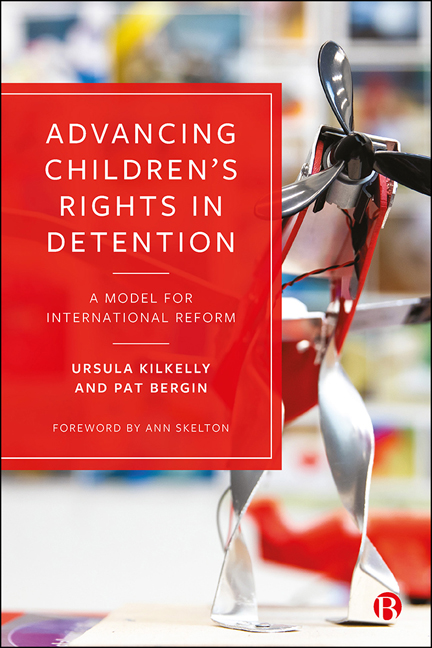Book contents
- Frontmatter
- Contents
- List of Cases and Instruments
- List of Figures
- About the Authors
- Acknowledgements
- Foreword
- Introduction
- 1 Children’s Rights in Detention
- 2 An International Perspective
- 3 Irish Youth Justice Law and Policy
- 4 Introducing Child Detention in Ireland
- 5 Oberstown and the Process of Change
- 6 Implementing Children’s Rights in Detention
- 7 Children’s Rights to Protection from Harm
- 8 Staff Wellbeing and Communication
- 9 International and National Influences and Advocacy
- 10 Reflections: Enablers and Barriers to Reform
- Afterword
- References
- Index
6 - Implementing Children’s Rights in Detention
Published online by Cambridge University Press: 13 May 2022
- Frontmatter
- Contents
- List of Cases and Instruments
- List of Figures
- About the Authors
- Acknowledgements
- Foreword
- Introduction
- 1 Children’s Rights in Detention
- 2 An International Perspective
- 3 Irish Youth Justice Law and Policy
- 4 Introducing Child Detention in Ireland
- 5 Oberstown and the Process of Change
- 6 Implementing Children’s Rights in Detention
- 7 Children’s Rights to Protection from Harm
- 8 Staff Wellbeing and Communication
- 9 International and National Influences and Advocacy
- 10 Reflections: Enablers and Barriers to Reform
- Afterword
- References
- Index
Summary
Introduction
Chapter 5 outlined the various stages of the reform process designed to create a unified and specialist model of detention for children. Building on this analysis, this chapter considers the extent to which the rights-based model of detention is currently implemented in Oberstown. It examines the measures taken to implement an approach that is child-centred and fulfils the rights of the child to provision, protection, participation, preparation and partnership in a model to advance the rights of children in detention.
Child-centred care
At the heart of an approach designed to advance children's rights in detention is the requirement to take account of the needs of the child – Article 37 of the United Nations Convention on the Rights of the Child (CRC) – and to ensure that the ‘conditions and circumstances’ ensure respect for their rights (Havana Rule 12). The international standards require ‘individual assessments’ of need and ‘a multi-disciplinary approach’ (CRC Committee, 2019a, p 18).
International standards recommend that on admission to detention, the child should be interviewed and a comprehensive assessment of their health, psychological, educational and social needs undertaken so that the child's type and level of care, including security, can be identified. A plan of educational and training programmes should be developed in accordance with the child's individual characteristics, taking account of the child's views (European Rule 62.6). Information about the child's identity, their legal guardians, the reasons for the commitment and the date and time of admission should be recorded (European Rule 62), along with details of the child's personal property, information about the child's history including any education or welfare needs, and with regard to the child's protection, ‘any visible injuries or allegations of prior ill-treatment’ and any information about the risk of self-harm or other health conditions that are relevant to the child's physical and mental wellbeing (European Rule 62).
In line with these standards, Oberstown is committed to decision-making that is informed by the child's best interests. To enable this approach, every child's current and emerging needs are assessed on arrival and an individual plan is put in place to fulfil those needs.
- Type
- Chapter
- Information
- Advancing Children's Rights in DetentionA Model for International Reform, pp. 87 - 104Publisher: Bristol University PressPrint publication year: 2021



